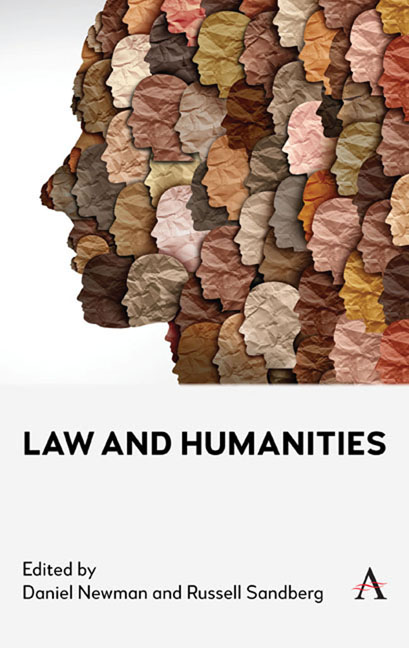Book contents
- Frontmatter
- Contents
- Preface
- List of Contributors
- Chapter One Introducing Law and Humanities
- Chapter Two Law and Archaeology
- Chapter Three Law and Comics/Graphic Justice
- Chapter Four Law and Film
- Chapter Five Law and Geography
- Chapter Six Law and History
- Chapter Seven Law and Literature
- Chapter Eight Law and Philosophy
- Chapter Nine Law and Popular Music
- Chapter Ten Law and Religion
- Chapter Eleven Law and Television
- Chapter Twelve Law and Theatre
- Chapter Thirteen Law and Theology
- Chapter Fourteen Law and Video Games
- Chapter Fifteen Conclusion: Subverting the Law and Humanities Canon
- Index
Chapter Eight - Law and Philosophy
Published online by Cambridge University Press: 27 March 2024
- Frontmatter
- Contents
- Preface
- List of Contributors
- Chapter One Introducing Law and Humanities
- Chapter Two Law and Archaeology
- Chapter Three Law and Comics/Graphic Justice
- Chapter Four Law and Film
- Chapter Five Law and Geography
- Chapter Six Law and History
- Chapter Seven Law and Literature
- Chapter Eight Law and Philosophy
- Chapter Nine Law and Popular Music
- Chapter Ten Law and Religion
- Chapter Eleven Law and Television
- Chapter Twelve Law and Theatre
- Chapter Thirteen Law and Theology
- Chapter Fourteen Law and Video Games
- Chapter Fifteen Conclusion: Subverting the Law and Humanities Canon
- Index
Summary
Introduction
This chapter looks at law and philosophy as it appears in the Law School. In contrast with some of the chapters in this volume, which consider emerging or prospective links between law and a humanities subject, law and philosophy are already closely bound together and have been a prominent part of the legal academy. They are bound by a shared interest in justice: probing relationships between state and citizen, unpicking the rules people are expected to live by and, centrally, exploring how to govern fairly. Concerns around justice are prominent philosophical concerns and play a central role in political philosophy, with justice central to debates in ethics as it looks at values, right and wrong action, obligations and rights. Within law, the field of legal philosophy takes its interest in what the law is and ought to be, which again brings justice concerns to the fore. Both political philosophy, which has tended to occur outside the Law School, and legal philosophy, from within, are typically brought together in the legal academy through the teaching of jurisprudence. Hence the connection between law and philosophy is firmly established with jurisprudence modules being common in Law Schools. And this impact of philosophy informs what is sometimes known as legal theory, which is the all-encompassing term for the approach that compliments and contrasts traditional black letter law.
Thus, legal theory derived at least in part from philosophy allows us to go beyond looking at the law in and of itself and ask bigger questions. As a teacher, for example, I use this theory to explore social justice, influenced by how such inquiry may explore the way law plays a role in structuring society to serve the ends of some, over others. For example, why do some people have their basic needs such as housing met while others do not? And what can be done to change things for the better? These questions can include asking how and why the law perpetuates certain structures of power. And thus, legal theorising can help us pursue issues of social justice – which can be such a powerful part of the legal academy and one of the topics that can most engage students. This gives us a means to explore the role that law plays in stratifying society along the lines of class, race and gender to name but a few prominent divisions.
- Type
- Chapter
- Information
- Law and Humanities , pp. 115 - 142Publisher: Anthem PressPrint publication year: 2024

